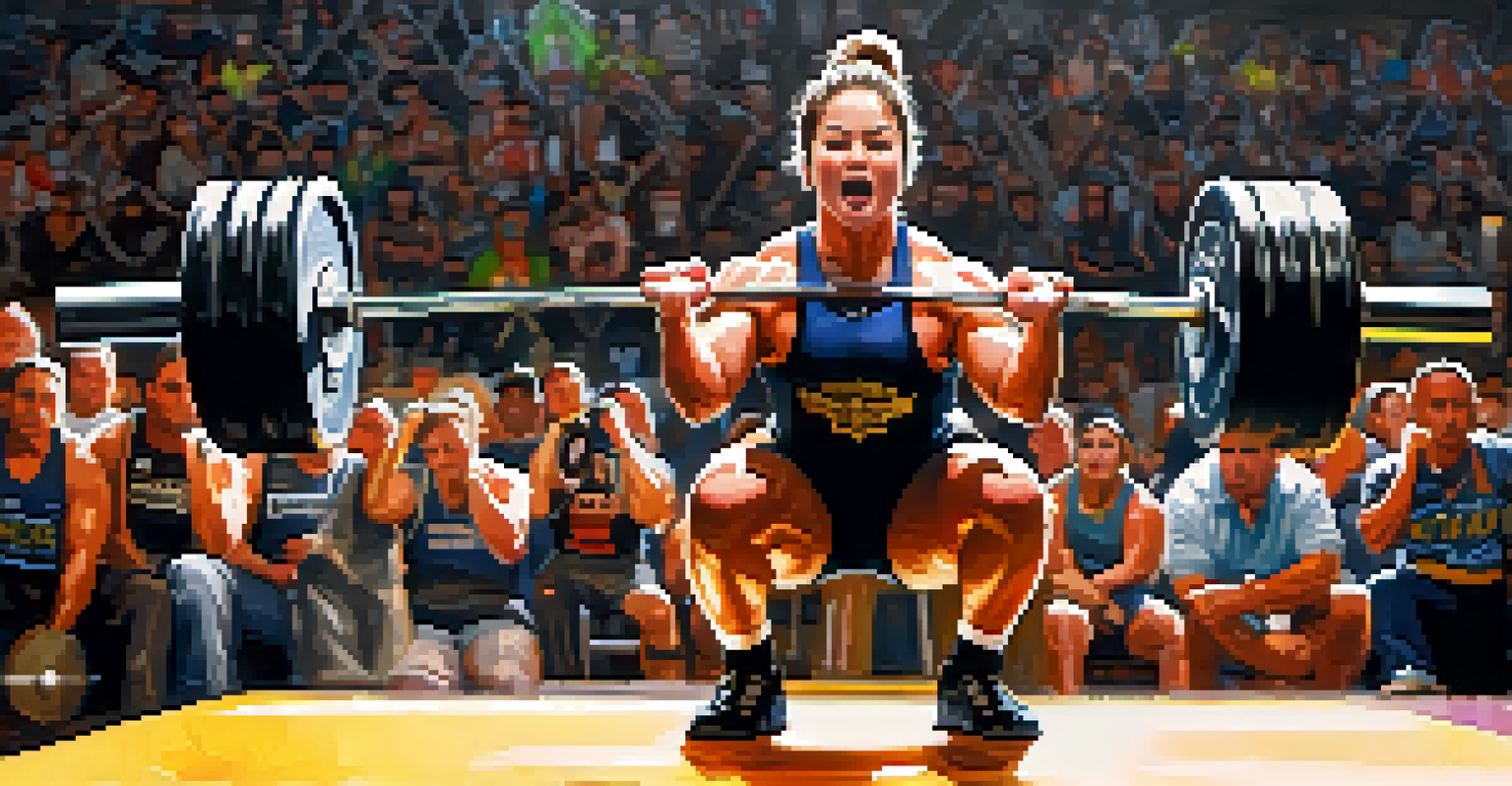Powerlifting: Building Resilience Through Overcoming Challenges

Understanding Powerlifting and Its Core Principles
Powerlifting is more than just lifting heavy weights; it’s a sport that emphasizes three main lifts: the squat, bench press, and deadlift. Each of these lifts requires not only physical strength but also mental fortitude. The combination of technique, strategy, and sheer willpower makes powerlifting a unique challenge that appeals to many.
Strength does not come from physical capacity. It comes from an indomitable will.
At its core, powerlifting teaches us about the importance of discipline and goal-setting. Lifters often start with specific weight targets and gradually work their way up, experiencing both triumphs and setbacks along the way. This gradual progression helps in building a resilient mindset, as athletes learn to embrace challenges as opportunities for growth.
Moreover, powerlifting fosters a sense of community among its practitioners. Whether you’re training in a local gym or competing at a national level, the support from fellow lifters can be invaluable. This camaraderie reinforces the idea that we’re all in this together, navigating our own challenges while cheering each other on.
The Journey of Overcoming Physical Challenges
One of the most significant aspects of powerlifting is the physical challenges it presents. Every lifter faces their own hurdles, whether it's overcoming an injury or pushing through mental barriers. These challenges teach us to listen to our bodies and respect our limits, while also encouraging us to push beyond them.

For instance, many powerlifters encounter plateaus, where progress seems to stall despite hard work. Instead of becoming discouraged, they learn to analyze their training, adjust their techniques, or even change their nutrition. This process of troubleshooting and adapting builds resilience, as athletes realize that setbacks are part of the journey.
Powerlifting Builds Mental Resilience
Through overcoming physical challenges, powerlifting cultivates mental toughness that translates to everyday life.
Additionally, conquering these physical challenges translates to everyday life. The grit developed in the gym can help individuals face personal or professional obstacles with newfound confidence. Just as a lifter learns to lift heavier weights, they can also tackle life’s challenges with a stronger mindset.
Mental Resilience: More Than Just a Physical Game
Mental resilience is a critical component of powerlifting that often gets overshadowed by physical strength. When faced with heavy weights, lifters must cultivate a strong mental game to succeed. This involves focusing on positive self-talk and visualization techniques to enhance performance.
The only limit to our realization of tomorrow will be our doubts of today.
For example, many athletes visualize themselves successfully completing a lift before they even approach the bar. This mental rehearsal helps to build confidence and reduces anxiety, preparing them for the actual lift. Over time, these mental strategies become second nature, allowing lifters to maintain composure under pressure.
Furthermore, the mental challenges of powerlifting extend beyond the gym. Lifters often face self-doubt and fear of failure, requiring them to confront these emotions head-on. By learning to manage their mental state, they develop resilience that can be applied in various aspects of life, from career challenges to personal relationships.
The Role of Goal Setting in Building Resilience
Goal setting is a fundamental practice in powerlifting that directly contributes to resilience. By establishing clear, achievable goals, lifters create a roadmap that guides their training and progress. These goals provide motivation and a sense of purpose, especially during tough times.
As lifters work towards their goals, they often encounter obstacles that test their resolve. Whether it’s a missed lift or an unexpected setback, these moments become valuable learning experiences. Each challenge faced and overcome not only moves them closer to their goals but also helps to solidify their resilience.
Community Enhances Training Success
The supportive powerlifting community fosters motivation and accountability, making it easier to tackle obstacles.
Moreover, celebrating small victories along the way reinforces the importance of persistence. Recognizing progress, no matter how incremental, fosters a positive mindset and encourages lifters to keep pushing forward. This approach to goal setting instills a sense of resilience that extends well beyond the gym.
Community Support: Strength in Numbers
Powerlifting thrives on community support, which plays a crucial role in building resilience. Training alongside others who share similar goals creates an environment of encouragement and accountability. This collective effort helps individuals stay motivated, even during challenging times.
In competitions, the energy from fellow lifters and spectators can be electrifying. The cheers and support from the crowd not only boost performance but also create lasting bonds among athletes. This sense of belonging reinforces the idea that we’re not alone in our struggles, making it easier to overcome obstacles.
Additionally, many lifters find mentors within the community who guide them through their journey. These relationships offer invaluable insights and encouragement, further solidifying resilience. The combined strength of a supportive community empowers individuals to tackle challenges head-on.
Lessons Learned: Applying Resilience to Daily Life
The resilience developed through powerlifting extends far beyond the gym. Lifters often find that the skills they cultivate—such as perseverance, goal-setting, and mental fortitude—translate seamlessly into everyday life. This ability to face challenges with confidence can lead to personal growth and success in various areas.
For instance, someone who regularly overcomes physical obstacles in powerlifting may find it easier to navigate stressful work situations or personal relationships. The mental toughness gained from lifting can empower them to tackle problems head-on instead of avoiding them. This shift in perspective can lead to positive changes in their overall quality of life.
Powerlifting Builds Mental Resilience
Lifters develop mental toughness through challenges, which helps them face obstacles confidently both in and out of the gym.
Ultimately, the lessons learned in powerlifting can inspire individuals to become more resilient in all aspects of life. By embracing challenges and viewing them as opportunities for growth, we can cultivate a mindset that thrives on resilience, no matter what obstacles we face.
Embracing the Process: Finding Joy in the Journey
In powerlifting, it’s essential to embrace the process rather than solely focusing on the end result. This mindset shift helps lifters find joy in the journey of improvement, making the experience more fulfilling. Celebrating the small victories along the way can enhance motivation and resilience.
For example, instead of fixating on a specific weight goal, lifters can take pride in their consistent training efforts, improved techniques, or increased confidence. This appreciation for the journey can make the inevitable setbacks feel less daunting. By recognizing the growth that occurs through challenges, lifters can maintain a positive outlook.

Moreover, this approach encourages a healthier relationship with failure. Instead of viewing setbacks as discouragements, lifters learn to see them as integral parts of their growth. This perspective not only fosters resilience but also helps individuals cultivate a lifelong love for the sport and its lessons.